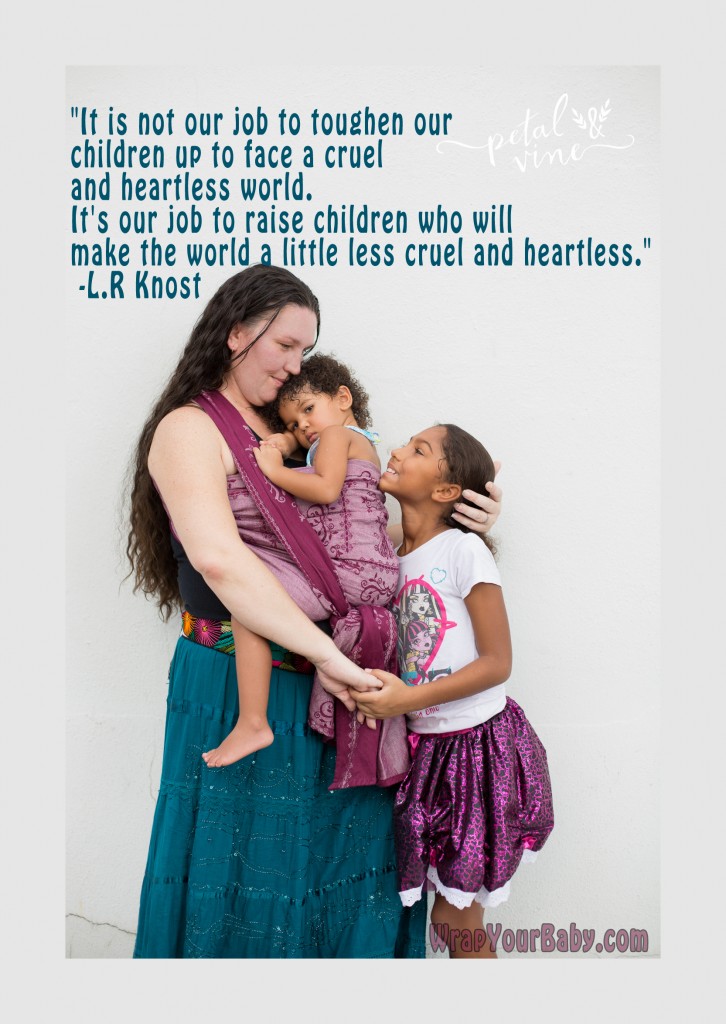I don’t want to spoil my baby!
If you carry your baby frequently in a comfortable baby carrier, won’t she get spoiled and want to be held all the time?
Well, some babies come already wired to scream whenever they’re put down and it doesn’t take spoiling to make them that way.
Some babies are generally pretty chill. They dig being carried, and the are perfectly content to sit in swings or bouncers, too.
A better question to ask is:
Is it important to let babies get used to not being held?
Short answer: no.
Long answer: this question is born from the idea that babies’ demands are different from their needs. But the fact is that at this tender age, babies are instinctive creatures. They aren’t calculating, they are responding to their needs in the way that evolution taught them to get our attention and make those needs known.
To us. The mother or father. The person who is mature enough to understand needs and capable enough to know how to satisfy them in an appropriate manner.
Because, face it, babies are helpless:
If you’re hungry, you go get a snack. A baby can’t.
If you’re too hot, you take off some clothes or turn on a fan. A baby can’t.
If your nose itches, you scratch it. A baby can’t.
If you are lonely, you call up a friend or walk into the other room to be with family. A baby can’t.
A baby is completely dependent.
It’s given the ability to cry – a noise designed to agitate us – as it’s only way to get it’s needs met.
So if you shift to thinking of a baby’s cry as a communication of a very valid need, you can start to figure out what is needed. And you will find that much of the time, simply picking up your baby satisfies the need. He or she wants to be held. Babies are designed to be held a lot for optimum development, and they’re designed to be uncomfortable when they’re not being held. That’s why babies who are held cry less. In 1986, the Journal of Pediatrics published a study in which researchers found that babywearing for three hours a day reduced infant crying by 43 percent overall and 54 percent during evening hours.
Of course, all babies are different. Follow your baby’s lead. Evolution (and Scientific studies) may give us the generalities of what babies need, but the specifics are definitely dictated on a unique one on one basis. If you have a happy and healthy baby, I would argue that you are doing the right thing.
And you know what? Babies grow up and learn independence when it’s developmentally appropriate, just as they learn to walk and talk and eat food without being taught. Respect the process. Respect your baby. He is developing and he will not be a baby forever.
Remember, there is no way for a baby–who is not mobile, cannot work doorknobs or handles or buttons on a thermostat–to be independent. “Teaching” him not to communicate his needs, that nobody is there to respond to his needs, is not a necessary part of healthy development.
“Don’t stand unmoving outside the door of a crying baby whose only desire is to touch you. Go to your baby. Go to your baby a million times. Demonstrate that people can be trusted, that the environment can be trusted, that we live in a benign universe.” ~Peggy O’Mara
So, will your baby want to be held all the time if he or she gets used to being carried? Maybe. Maybe you’ll get spoiled too, by the convenience, the content and quiet baby, and the constant cuddles. Congratulations–you have a baby! It’s temporary, it’s exhausting, and it’s magical. There are worse problems.
Babywearing out of guilt or obligation?
I don’t want you to do that. I really don’t. I think the best thing you can give your baby is a happy, healthy parent. You should use a baby carrier because it makes life easier and happier for all of you. If it doesn’t, chances are that another parent who is experienced with the same carrier can help you learn easy tweaks for making it more comfortable, or more convenient to use. Look for a local babywearing group, or ask local midwives or visit a La Leche League meeting to find someone who may be able to help. If there is no local help, you can avail yourself of free online resources like www.thebabywearer.com and you can always ask for help or guidance on www.facebook.com/wrapyourbaby



Leave a Comment